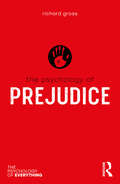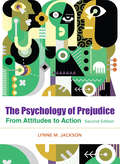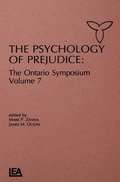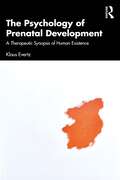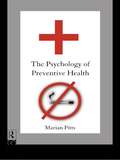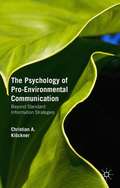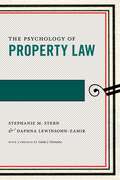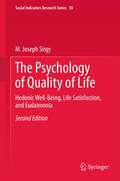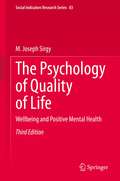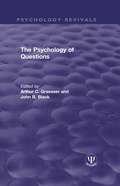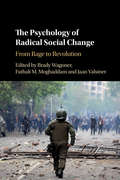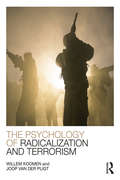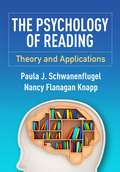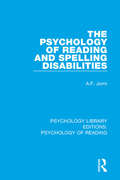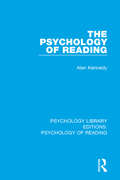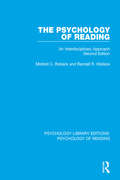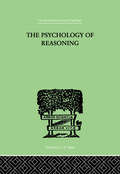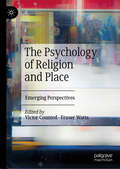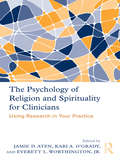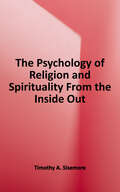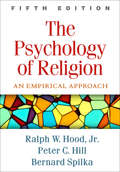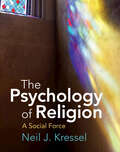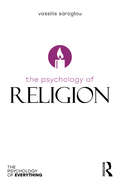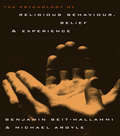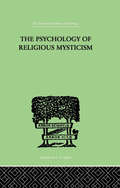- Table View
- List View
The Psychology of Prejudice (The Psychology of Everything)
by Richard GrossWhy do we develop extreme attitudes to others? Can our personality contribute to our prejudices? How do we reduce prejudice and discrimination? The Psychology of Prejudice explores different forms of prejudice and discrimination, from racial jokes to genocide. It looks at what might cause our prejudiced attitudes, including our personalities, social influences, group identity, and evolutionary factors, and how prejudice can be reduced through education, campaigning, and consciousness raising. Offering insights into a topic of great public concern and debate, The Psychology of Prejudice shows us how we can confront our prejudiced attitudes and contribute to greater tolerance and understanding.
The Psychology of Prejudice: From Attitudes to Social Action
by Lynne M. JacksonThis second edition of Lynne Jackson&’s seminal text presents a significantly updated review of the psychological underpinnings of prejudicial attitudes and behaviors. Given the weaponization of cultural and ideological differences in politics, education, and social media today, the need to understand and fight prejudice is urgent. Jackson synthesizes new research from various areas of psychology to analyze contemporary examples of prejudice, including anti-immigrant policies, police violence against minorities, anti-woman and LGBTQ backlash, and ageist cultural biases. She also explores frequently overlooked issues related to prejudice, such as environmental inequality and speciesism. Drawing from literature in social, developmental, evolutionary, and personality psychology, Jackson explores the environmental and biological roots of prejudice, explaining how societal factors and human predispositions shape how people understand and respond to diversity. She draws connections between prejudice and other social justice issues showing how it is related to greater social problems like inequality and political polarization. She also offers readers a blueprint for overcoming these deeply embedded biases by improving intergroup attitudes and building communities to create progressive social change.
The Psychology of Prejudice: The Ontario Symposium, Volume 7 (Ontario Symposia on Personality and Social Psychology Series #Vol. 7)
by James M. Olson Mark P. ZannaThis volume consists of expanded and updated versions of papers presented at the Seventh Ontario Symposium on Personality and Social Psychology. The series is designed to bring together scholars from across North America who work in the same substantive area, with the goals of identifying common concerns and integrating research findings. The topic of this symposium was the psychology of prejudice and the presentations covered a wide variety of issues. The papers present state-of-the-art research programs addressing prejudice from the point of view of both the bigoted person as well as the victim of bigotry. The chapter authors confront this issue from two major -- and previously separate -- research traditions: the psychology of attitude and intergroup conflict. The chapters are organized in the following sequence of topics: the determinants and consequences of stereotypes, individual differences in prejudicial attitudes, intergroup relations, the responses of victims to prejudice and discrimination, and an integrative summary/commentary. Illustrating both the diversity and vitality of research on the psychology of prejudice, the editors hope that this volume will stimulate further research and theorizing in this area.
The Psychology of Prenatal Development: A Therapeutic Synopsis of Human Existence
by Klaus EvertzThis important book introduces the basics of prenatal psychology and works through the current scientific findings in the psychology and psychosomatics of pregnancy and birth. Through exploring bio-psycho-social relationships, as well as historical and cultural perspectives, this interdisciplinary approach easily breaks down specialist discussions into easy-to-understand concepts.Bridging the gap between foetal programming and psychological research and practice, this accessible book presents the history of the field and the basic concepts of prenatal development before exploring the behavioural dimensions of life before, during, and immediately after birth. Topics include sensory and emotional development in the womb, perception and brain development, the influence of environmental factors and prenatal imprinting and long-term effects. The author also delves into the concept of attachment and support and analyses body symptoms, sensations, feelings and inner images in dreams and imaginations, through the role of art creations and biographical narratives. As a whole, this book provides a therapeutic synopsis of the entire existence, which begins with conception.Explaining how experiences in the prenatal period influence basic psychological imprints across the lifespan, this book is an essential resource for students in a wide range of interrelated disciplines, including developmental psychology, paediatric medicine, neuroscience, infancy and early child development, nursing, social work and early childhood education. It may also be of interest to researchers, clinicians and related professionals.
The Psychology of Preventive Health
by Marian PittsShould I vaccinate my child? Can we stop ourselves getting cancer? How much can I safely drink? These are the everyday questions that health educators and promoters face from the public, but how should they best be answered? From her extensive experience in health psychology Marian Pitts provides an overview of the latest research in the area of preventive health and questions some underlying assumptions in current practice. The Psychology of Preventive Health is written for students and health professionals interested in widening their perspectives on issues concerning primary health care.
The Psychology of Pro-Environmental Communication: Beyond Standard Information Strategies
by Christian A. KlöcknerThe environment is part of everyone's life but there are difficulties in communicating complex environmental problems, such as climate change, to a lay audience. In this book Klöckner defines environmental communication, providing a comprehensive and up-to-date analysis of the issues involved in encouraging pro-environmental behaviour.
The Psychology of Property Law (Psychology and the Law #3)
by Stephanie M. Stern Daphna Lewinsohn-ZamirConsiders how research in psychology offers new perspectives on property law, and suggests avenues of reform Property law governs the acquisition, use and transfer of resources. It resolves competing claims to property, provides legal rules for transactions, affords protection to property from interference by the state, and determines remedies for injury to property rights. In seeking to accomplish these goals, the law of property is concerned with human cognition and behavior. How do we allocate property, both initially and over time, and what factors determine the perceived fairness of those distributions? What social and psychological forces underlie determinations that certain uses of property are reasonable? What remedies do property owners prefer? The Psychology of Property Law explains how assumptions about human judgement, decision-making and behavior have shaped different property rules and examines to what extent these assumptions are supported by the research. Employing key findings from psychology, the book considers whether property law’s goals could be achieved more successfully with different rules. In addition, the book highlights property laws and conflicts that offer productive areas for further behaviorally-informed research. The book critically addresses several topics from property law for which psychology has a great deal to contribute. These include ownership and possession, legal protections for residential and personal property, takings of property by the state, redistribution through property law, real estate transactions, discrimination in housing and land use, and remedies for injury to property.
The Psychology of Quality of Life
by M. Joseph SirgyThe second edition will be an update and further elaboration of the literature related to subjective well-being, happiness, and life satisfaction. It will have a new substantial section that focuses on reviewing much of the literature of subjective well-being within specific life domains (social life, material life, leisure life, work life, community life, spiritual life, family life, health life, sex life, travel life, etc.) In the 1st edition the research in these various life domains was discussed only briefly. The second edition will maintain the same organizational structure of the first edition; that is, Part 1 will focus on introduction (definitions and distinctions; examples of measures of subjective well-being, happiness, and life satisfaction; and motives underlying subjective well-being). Part 2 will focus on psychological strategies that are allow people to optimize subjective well-being by engaging in psychological processes related to the relationship between and among life domains (e.g., social life, family life, love life, spiritual life, community life, financial life, etc.) This part will contain four chapters related to these various "inter-domain" processes: bottom-up spillover, top-down spillover, horizontal spillover, and compensation. Part 3 of the book will focus on "intra-domain" psychological strategies designed to optimize subjective well-being. These include re-evaluation based on personal history, re-evaluation based on self-concept, re-evaluation based on social comparison, goal selection, goal implementation and attainment, and re-appraisal. Part 4 of the book will focus on balance processes--how people attempt to create balance in their lives using psychological processes within specific life domains (intra-domain strategies) and processes that relate one domain to another (inter-domain strategies).
The Psychology of Quality of Life: Wellbeing and Positive Mental Health (Social Indicators Research Series #83)
by M. Joseph SirgyThe third, thoroughly revised and enhanced edition of this bestselling book analyses and discusses the most up-to-date research on the psychology of quality of life. The book is divided into six parts. The introductory part lays the philosophical and academic foundation of much of the research on wellbeing and positive mental health, showing the beneficial effects of happy people at work, health, and to society at large. Part 2 (effects of objective reality) describes how sociocultural factors, income factors, other demographic factors, and biological and health conditions affect wellbeing and positive mental health. Part 3 focuses on subjective reality and discusses how individuals process information from their objective environment, and how they manipulate this information that affects wellbeing and positive mental health. Part 4 focuses on the psychology of quality of life specific to life domains, while Part 5 reviews the research on special populations: children, women, the elderly, but also the disabled, drug addicts, prostitutes, emergency personnel, immigrants, teachers, and caregivers. The final part of the book focuses on theories and models of wellbeing and positive mental health that integrate and unify disparate concepts and programs of research. The book addresses the importance of the psychology of quality of life in the context of public policy and calls for a broadening of the approach in happiness research to incorporate other aspects of quality of life at the group, community, and societal levels. It is of topical interest to academics, students and researchers of quality of life, well-being research, happiness studies, psychotherapy, and social policy.
The Psychology of Questions (Psychology Revivals)
by Arthur C. Graesser John B. BlackOriginally published in 1985, the chapters in this volume collectively approach the phenomenon of questioning from many perspectives. There are studies on question comprehension, question answering, question asking and the influence of adjunct questions on text comprehension and memory. The chapters cover different theories, models, methods, and practical applications. Some contributors focus exclusively on adult subjects, whereas other examine cognitive development in children. The earlier chapters in the book have a "pure science" emphasis, whereas the later chapters have an "applied" emphasis. Of course, the distinction between science and application had, in the editors’ words, become "very fuzzy" in the years prior to publication.
The Psychology of Radical Social Change: From Rage to Revolution
by Jaan Valsiner Fathali M. Moghaddam Brady WagonerSince 2011 the world has experienced an explosion of popular uprisings that began in the Middle East and quickly spread to other regions. What are the different social-psychological conditions for these events to emerge, what different trajectories do they take, and how are they are represented to the public? To answer these questions, this book applies the latest social psychological theories to contextualized cases of revolutions and uprisings from the eighteenth to the twenty-first century in countries around the world. In so doing, it explores continuities and discontinuities between past and present uprisings, and foregrounds such issues as the crowds, collective action, identity changes, globalization, radicalization, the plasticity of political behaviour, and public communication.
The Psychology of Radicalization and Terrorism
by Joop Van Der Pligt Willem KoomenTerrorism and radicalization have a long history, but in recent years their prominence has been a particularly conspicuous and influential feature of the global political landscape. This important book presents an overview of the processes involved in radicalization and terrorism, and introduces a systematic framework which captures the most crucial individual and social factors involved in determining these processes. The authors begin by considering the possible role of prejudice, economic deprivation, and discrimination, and the cognitive responses and emotions they can trigger. Such responses tend in turn to increase the importance of group membership, and promote intergroup differentiation and polarization, a process which is often accompanied by more pronounced and more extreme religious and ideological beliefs. The book also describes the role of cultural values and social climate in processes of radicalization, as well as the role of personality factors and demographics such as age and marital status. As for violent terrorist action itself, this final most radical stage is elicited by a number of group factors such as groupthink, isolation, and leadership. Certain cognitive mechanisms - for example, dehumanizing the target and attributing responsibility elsewhere - can also provide excuses for violence. The book explores why some groups turn to violence and others don't, and it addresses processes of disengagement, deradicalization programs, and other methods used to inhibit the spread of radicalization and terrorism. The Psychology of Radicalization and Terrorism takes a unique and systematic approach to a vital topic, integrating knowledge from diverse literatures, and using social psychology as a basis for comprehending human behaviour. It will be essential reading for students and researchers from all disciplines seeking a greater understanding of terrorism and violent political conflict in all its forms.
The Psychology of Reading
by PhD Paula J. Schwanenflugel Nancy Flanagan KnappIncorporating cognitive, neuropsychological, and sociocultural perspectives, this authoritative text explains the psychological processes involved in reading and describes applications for educational practice. The book follows a clear developmental sequence, from the impact of the early family environment through the acquisition of emergent literacy skills and the increasingly complex abilities required for word recognition, reading fluency, vocabulary growth, and text comprehension. Linguistic and cultural factors in individual reading differences are examined, as are psychological dimensions of reading motivation and the personal and societal benefits of reading. Pedagogical Features: *End-of-chapter discussion questions and suggestions for further reading. *Explicit linkages among theory, research, standards (including the Common Core State Standards), and instruction. *Engaging case studies at the beginning of each chapter. *Technology Toolbox features exploring the pros and cons of computer-assisted learning.
The Psychology of Reading and Spelling Disabilities (Psychology Library Editions: Psychology of Reading #4)
by A.F. JormOriginally published in 1983, recent advances in cognitive psychology had revealed that reading and spelling disabilities may be due to deficits in basic cognitive processes. Dr Jorm looks at each type of disability in detail, in relation to normality as well as intellectual disability (formerly called retardation), and finds that the new research provides a useful approach to seemingly intractable problems. He covers a broad range of topics, including the social context of reading disabilities, the role of biological factors, remedial teaching, and prevention of literacy problems. He also gives a forward-looking account of how research at the time on the cognitive processes in comprehension might aid our understanding of the relatively neglected group of children who can read individual words yet fail to comprehend adequately. Reading disabilities are increasingly serious in a culture which places an ever higher value on literacy, and the discoveries of the cognitive psychologists are presented here in a way that will still be accessible to all those teachers and parents who want to know about developments in the past.
The Psychology of Reading: A Special Issue Of The European Journal Of Cognitive Psychology (Psychology Library Editions: Psychology of Reading #5)
by Alan KennedyOriginally published in 1984, this new introductory text fulfilled a need amongst both psychology and education students for a book which dealt with reading in a way that explored areas beyond the strictly practical question of how to teach children to read. Previous books on the psychology of reading had often concentrated on the analytic approach, in which reading had been seen in terms of a set of interconnected sub-skills and the experimental study of these components had become an end in itself. As a result, although great advances had been made in our understanding of certain aspects of the process, psychological studies of reading had increasingly been seen by teachers and others as unduly abstract. The Psychology of Reading goes back to first principles and attempts to set reading in its context alongside other cognitive activities, particularly those involving memory and perceptual processes. Professor Kennedy argues that it is wrong to set reading apart as a ‘skill’ when it needs to be understood against a background of work in cognitive psychology. Reading is a social phenomenon concerned with human communication, and in this context it must be seen in terms of an interaction between writer and reader. The book explores the nature of this interaction and the various stylistic and other devices which sustain the ‘contract’ between reader and writer. In particular, the psychological processes which allow a reader to make sensible assumptions about a writer’s intentions are dealt with in detail. No theory of reading, the author argues, should ignore the purpose of the enterprise. Similarly, explaining success and failure in teaching children to read may well hinge on an understanding of what children think reading is about. The style of this book is concise and largely non-technical. The Psychology of Reading will be welcomed as stimulating and demanding by experts and non-specialist general readers alike.
The Psychology of Reading: An Interdisciplinary Approach (2nd Edn) (Psychology Library Editions: Psychology of Reading #10)
by Mildred C. Robeck Randall R. WallaceThe need to know why as well as how children and youth respond as they do to reading instruction has guided the selection of this book’s content. The second edition of this title, originally published in 1990, has retained and elaborated upon the three major themes previously presented: that reading is a linguistic process; that motivation, the affective domain, may be as important in learning to read as the cognitive domain; and that the reality of learning theory is to be found in the mechanisms of the brain where information is mediated and memory traces are stored.The text integrates views from cognitive psychology, psycholinguistics, and neuropsychology as they relate to reading and writing. A learning-motivation model is provided to present associative learning, conceptualization, and self-directed reading in a hierarchical relationship with distinct cognitive and affective components. The distinction between beginning and proficient reading is maintained throughout the text.
The Psychology of Reasoning (International Library Of Psychology Ser.)
by Rignano, EugenioFirst Published in 1999. Routledge is an imprint of Taylor & Francis, an informa company.
The Psychology of Religion and Place: Emerging Perspectives
by Fraser Watts Victor CountedThis book examines the role of religious and spiritual experiences in people’s understanding of their environment. The contributors consider how understandings and experiences of religious and place connections are motivated by the need to seek and maintain contact with perceptual objects, so as to form meaningful relationship experiences. The volume is one of the first scholarly attempts to discuss the psychological links between place and religious experiences.The chapters within provide insights for understanding how people’s experiences with geographical places and the sacred serve as agencies for meaning-making, pro-social behaviour, and psychological adjustment in everyday life.
The Psychology of Religion and Spirituality for Clinicians: Using Research in Your Practice
by Everett L. Worthington Jr. Jamie D. Aten Kari A. O’gradyMany therapists and counselors find themselves struggling to connect the research on the psychology of religion and spirituality to their clinical practice. This book will address this issue, providing a valuable resource for clinicians that will help translate basic research findings into useful clinical practice strategies. The editors and chapter authors, all talented and respected scholar-clinicians, offer a practical and functional understanding of the empirical literature on the psychology of religion and spirituality of, while at the same time outlining clinical implications, assessments, and strategies for counseling and psychotherapy. Chapters cover such topics as religious and spiritual identity, its development, and its relationship with one’s personality; client God images; spiritually transcendent experiences; forgiveness and reconciliation; and religion and spirituality in couples and families. Each concludes with clinical application questions and suggestions for further reading. This book is a must-read for all those wishing to ground their clinical work in an empirical understanding of the role that religion and spirituality plays in the lives of their clients.
The Psychology of Religion and Spirituality: From the Inside Out
by Timothy A. SisemoreThis book provides and introduction to the field of the psychology of religion and spirituality utilizing a mixed method approach allowing persons of faith (and one who is an atheist) to give voice to their experience to supplement the quantitative research that has been done in the field. The text honors the value of religion and spirituality in the lives of the majority of humans while acknowledging the weakness and problems that come with faith as well.
The Psychology of Religion, Fifth Edition: An Empirical Approach (Archive For The Psychology Of Religion/ Archiv Fur Religionspsychologie Ser. #Vol. 27)
by Bernard Spilka Ralph W. Hood Jr. Peter C. HillKeeping up with the rapidly growing research base, the leading graduate-level psychology of religion text is now in a fully updated fifth edition. It takes a balanced, empirically driven approach to understanding the role of religion in individual functioning and social behavior. Integrating research on numerous different faith traditions, the book addresses the quest for meaning; links between religion and biology; religious thought, belief, and behavior across the lifespan; experiential dimensions of religion and spirituality; the social psychology of religious organizations; and connections to coping, adjustment, and mental disorder. Chapter-opening quotations and topical research boxes enhance the readability of this highly instructive text. New to This Edition *New topics: cognitive science of religion; religion and violence; and groups that advocate terrorist tactics. *The latest empirical findings, including hundreds of new references. *Expanded discussion of atheism and varieties of nonbelief. *More research on religions outside the Judeo-Christian tradition, particularly Islam. *State-of-the-art research methods, including techniques for assessing neurological states.
The Psychology of Religion: A Social Force
by Neil J. KresselMany of the greatest minds in psychology have tried to unravel the mysteries, power, appeal, and consequences of religion. The task of understanding human behaviour will never be complete without the use of science and logic to examine the psychology of religion and spirituality. This undergraduate textbook provides an engaging and accessible tour of the field, drawing on historical, theoretical, and cutting-edge sources. It explores the origins and meaning of various forms of religious belief around the globe, with enhanced coverage of non-Christian religions, non-believers, and diverse populations. By focusing on the personal, medical, moral, social, and political consequences of religion, it explores how these findings can be applied in real-world scenarios. Students are supported by clear learning objectives, defined key concepts, varied end-of-chapter questions, further reading suggestions, and visual content, making this an invaluable resource for undergraduates in the psychology of religion and spirituality.
The Psychology of Religion: Structuring The Religious Experience (The Psychology of Everything #10)
by Vassilis SaroglouDoes religion positively affect well-being? What leads to fundamentalism? Do religious beliefs make us more moral? The Psychology of Religion explores the often contradictory ideas people have about religion and religious faiths, spirituality, fundamentalism, and atheism. The book examines whether we choose to be religious, or whether it is down to factors such as genes, environment, personality, cognition, and emotion. It analyses religion’s effects on morality, health, and social behavior and asks whether religion will survive in our modern society. Offering a balanced view, The Psychology of Religion shows that both religiosity and atheism have their own psychological costs and benefits, with some of them becoming more salient in certain environments.
The Psychology of Religious Behaviour, Belief and Experience
by Michael Argyle Benjamin Beit-HallahmiBecause society is increasingly secular, it may seem irrelevant to consider the psychology of religion. But the diversity of our multi-ethnic and multi-cultural society in fact makes religion more important to the social sciences than it has ever been before. What are the social consequences of religion? Every day the news is full of events that can be blamed on religion perpetrated by a range of groups from whole societies to individuals. Beit-Hallami and Argyle are renowned for their clear, analytical approach to topics and this new, state-of-the-art study of psychology and religion is no exception. It will be welcomed as an update to their previous work in the area by social psychologists, sociologists and theologians worldwide.
The Psychology of Religious Mysticism
by James H. LeubaFirst Published in 1999. Routledge is an imprint of Taylor & Francis, an informa company.
